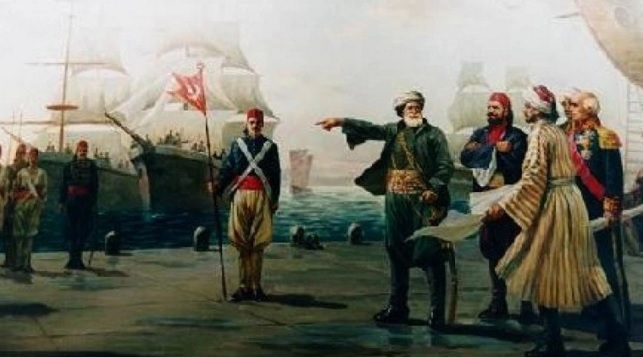It is an extraordinary story of a boy who was born in Zemblak of Korca in 1769. His family moved in Kavala, Greece, the city built by Alexander the Great in the memory of his horse. Mehmet Ali was the 17th child of Ibrahim Agai.
According to legend, the first public task is performed by Mehmet when he was only 18-years old. A nearby village did not pay taxes. He went with 10 armed men and asked to meet four leaders of the village. He put them in mosque and promised they would not get out alive if the village did not pay taxes.
He went in Egypt as a soldier, but soon became the commander and then the Pasha. He led Egypt to prosperity, independence, and created the Albanian monarchy no matter that he could not write and speak another language except Albanian.
Looking the situation of Egypt at that time, Mehmet Ali was the one who started the development of the country and himself. A great burst, the Albanian leader of Egypt gave to agriculture, industry and trade, increasing the well-being of the people of Egypt.
In Alexandria, Rozet, Damia and elsewhere began to built large factories, while the French yield support. More than a thousand ships traversing the Nile.
Thus, the city of the pharaohs began to unravel. French missions began to work on archeology. In 1822, Campollion found and unbuttoned the alphabet oh hieroglyphs, crowning a jod that started in 1798
“The Mehmet Ali work is rare and strange to the history of the world, is full of triumphs, profits in war and diplomacy, after which the historian is shocked”, writes in his book, Alexander Xhuvani.
In 1824, following the barbarian uprisings in Greece, Sultan Mahmud II was not able to crush the Greek rebellion, and asked help from Mehmet Ali, who send his son Ibrahim Pasha at the top of this expedition, who succeded in supressing the revolts in Greece. As a result of this victory, Mehmet Ali was awarded by the Sultan to become governor of Crete. But the major powers (Britain, France, Russia), seeing the the broad sprawl of Mehmet Ali from Sudan to Crete, in 1827 sent their armies to battle Ibrahim Pasha, the son of Mehmet Ali, who after the collision with the great powers broke down, and was forced to leave the fight on Greek terrorism. He left 93 warships in the battlefield.
Earlier, he and his son destroyed the Wahhabi movement that had invaded Mecca and Medina. They even arrested Wahhabi state leader, Abdullah bin Saud, executed in Istanbul.
After the battle of 1839, who by the son of Mehmet Ali, Ibrahim Pasha, who broke the Ottoman armies in Konya, Anatolia, began the march toward Constantinople, where, according to many historians, the ambitions Mehmet Ali were to become the Sultan the Islamic state. But, seeing the strength and vitality of Mehmet Ali, the great powers stopped and again threatened Mehmet Ali, not to advance further.
After this latest effort, Mehmet Ali retreated to Egypt, where was granted the right of Khedivllek (absolute rulers) on Egypt, where his nephew’s generation led Egipt untill 1952.
On August 2, 1849, Mehmet Ali Pasha died in Alexandria. His body was wrapped in a cashmere shawl, in his head the Tunisian feast and his sword. The coffin was followed by 22 sheiks, reading verses from the Koran on the road to the mosque of the Alabastrs to Cairo, where he was buried. This was the story of an Albanian from Kavala, who was illiterate, but within a few years transformed the Egypt in a port of interaction of European and Egyptian cultures.
Ismail Pasha’s successor Mehmet Ali is known as the modernizer of Egypt. He ruled from 1863 until 1879.
He was the leader who founded the postal service, modernized the army, turning it into a modern army, constructed the railway. His largest did well known all over the world is the Suez Canal, an artificial sea channel, with a length of 163 kilometers – the hub connecting the eastern and western hemisphere of the earth. The Suez Canal has great strategic importance, because it is the most important marine tanker to supply Europe with Middle East oil. The Suez Canal was opened in 1869. The high cost of construction of this channel forced Ismail Pasha to sell it to the British, who build it in concession.
The last of the Mehmet Ali dynasty was King Farouk, ousted from throne from nationalist uprisings.
In 1952 times changed in Egypt. Nationalists refused to be ruled by the kingdom dynasty. The revolution led by the General Abdul Nasser overthrew the dynasty of Albanian blood. On January 26, 1952 a partial burning of the city of Cairo occured and on July 23, when Faruk was in Alexandria, the conspirator group “Free Officers” led by General Naguib took control of Cairo.
King Faruk immigrated to Italy and died in Rome in 1965.
Whar have been said about the king Faruk:
Dora d’Istria: Mehmet Ali is grabbed by such a passion for France, as one can say that the rebirth of the pharaohs of ancient empire, is the result of a Franco-Albanian alliance!
French Consul, Mourriez: I asked him one day why so often Mehmet Ali said he was Albanian. He replied: “I am such and my tongue is Albanian. Do you hear me when I speak to guards! … I am an Albanian and as an Albanian I’m going to die, though I tried to be a good Egyptian!
Fan Noli: Mehmet Ali was really religious but no fanatic and this crucial fact made him open to Western ideas, because of fanaticism nothing good comes. A fabulous idea, fully confirmed by History and thrown away in disgust from French luminaries of the 18th century and by the French Revolution itself.”


